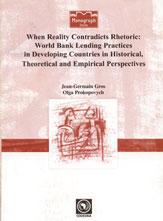When Reality Contradicts Rhetoric: World Bank Lending Practices in Developing Countries in Historical, Theoretical and Empirical Perspectives
Keywords:
Reality Contradicts, Rhetoric, World BankSynopsis
‘Gros and Propokovych provide a brilliant and balanced critique of the World Bank – “world’s largest multilateral development lending agency”, in relation to poverty reduction in developing countries. Coming at a time when, thanks to the hegemonic forces of globalisation and the increasing domestication of market-based economic reforms, sharp criticisms of the Bank’s pernicious lending practices in the developing world have become muted, this monograph is an important reminder of the continued existence of the problem of poverty, and how World Bank lending has worsened the economic crises in developing countries.
Adopting a triple-pronged historical, theoretical and empirical approach, the authors explore the Bank’s moorings in neo-liberal market ideology and western hegemony. They show how its dismal record has contradicted its rhetoric on poverty reduction – its lending has neither gone to the poorest countries, nor reached the poorest people in the developing countries.
Confirming what is well known; they add a new dimension showing that the World Bank’s lending behaviour is moderated by its organisational/bureaucratic politics, the external environment and the personality of its Presidents, and is largely an agent for the domination of poor countries by rich countries. The Bank is hardly democratic or transparent, even as it attempts to hide the highly asymmetrical power relations between itself and the borrower-countries in the developing world behind pro-poor rhetoric.
This monograph goes beneath the rhetoric to explode the pro-poor myth of the World Bank’s lending practices in developing countries. It brings to the fore one of the most critical challenges confronting the developing world – poverty – and suggests how the Bank must be radically transformed in a rapidly globalising world to deal with the problem. Its uniqueness lies both in its depth and clarity, and in its optimism that the World Bank, warts and all, can be revolutionized in the 21st century!’
‘This study of World Bank lending policies as they relate to economic development in Third World countries is innovative, comprehensive and, more importantly, entirely convincing. The weight of the compelling empirical evidence the authors provided is guided by a theoretical critique that provides one of the most cogent analysis of World Bank lending to date. In short, the inherent failure of World Bank lending policies in the underdeveloped world, including a critical examination of the neo-liberalist ideology guiding the Bank’s policies, is explained in one of the most exhaustive and insightful studies in the broader field of political economy’.
Dr. Michael Williams, University of Ghana, Legon, Accra
Downloads






